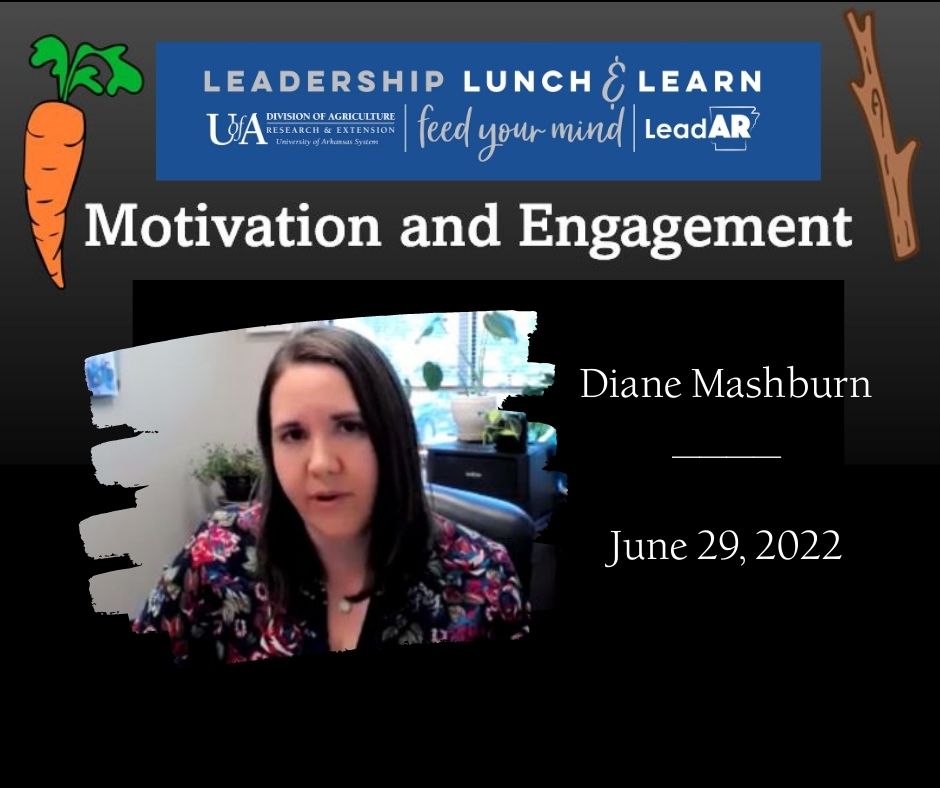Posts
Contact
Lisa Davis
Program Associate-Leadership
Phone: 501-519-5472
Email: ldavis@uada.edu
University of Arkansas System Division of Agriculture
Cooperative Extension Service
2301 S. University Avenue
Little Rock, AR 72204
June Leadership Lunch and Learn (LLL): Motivation and Engagement Moving Beyond Carrots and Sticks
“Carrots and sticks are more manipulation than motivation. True, they create action
and transactions but not loyalty,” said Diane Mashburn, University of Arkansas System
Division of Agriculture (UADA) instructor—program planning, evaluation, and accountability,
in the June session of Leadership Lunch and Learn (LLL).
She suggested that you start with the “why” to motivate others. Often, we focus on “what” and “how.” Instead, she proposed that we flip this concept, and start with “why” — working back to “what.” "Why" is more compelling. It taps into interest and passion. View Simon Sinek's, author of Start with Why, video here.
Next, she shared information about the content of The Five Languages of Appreciation in the Workplace by Gary Chapman and Paul White. The five languages include:
1. Physical Touch
Examples of physical touch include handshake, high five, pat on back, hug (in the case of a personal incident and individualized by type of work relationship).
She suggested the following notes to consider about physical touch.
- Touch is controversial in the workplace.
- Initial research showed physical touch is rarely a primary appreciation language.
- There are few appropriate ways to show appreciation using touch.
- Always ask before expressing appreciation using touch.
2. Tangible Gifts
Some examples of tangible gifts include food, gift cards, tickets to an event. Key components to consider to make gifts given impactful.
- Give to those who appreciate them.
- Give a gift they will value.
3. Acts of Service
Some examples of acts of service include helping a co-worker or employee finish a task, helping clean up after an event, helping assemble swag bags, just to name a few. If you offer to help, Mashburn suggested you keep the following in mind.
- Make sure your own responsibilities are covered before volunteering to help others.
- Ask before you help.
- Don’t assume you know what help they want or need.
- If you are going to help, do it their way.
- Serve voluntarily.
- Check your attitude.
- Complete what you start.
4. Quality Time
Quality time means spending time with a colleague either by giving the person your focused attention or working collaboratively with them. Examples include focused attention, quality conversations, shared experiences, working collegially with coworkers on a task, small group dialogue. Considerations for quality time:
- Who—with whom do they want that quality time?
- When—during or after work time?
- Where—in person or virtual?
- How—convey sincerity.
5. Words of Affirmation
"Words of affirmation" is the most commone language in the workplace. Words of affirmation are any spoken or written words that confirm, support, uplift, and empathize with another person in a positive manner. Examples include praise for accomplishments, affirmation for character, praise for personality. Mashburn suggested the following regarding how and where to affirm.
- Personal, one-on-one
- Praise in front of others
- Written affirmation
- Public affirmation
Key Considerations:
- Be sincere and authentic
- Pay attention to their preferences
- Be consistent with your words in both public and private settings
- Don’t neglect affirming others
If you would like to access the full presentation, click here.
The next session in the LLL series will be July 27, 12:15 – 1 p.m. on “Persuasive Speaking” presented by Dr. Hunter Goodman, UADA CES community, workforce, and economic development associate professor.